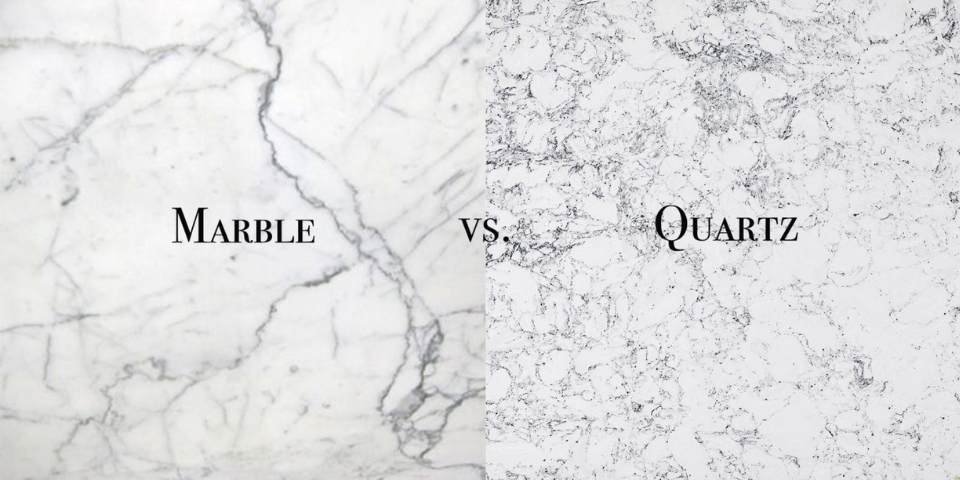Quartz vs Marble Countertops! What Is The Difference Between Quartz and Marble? Quartz, which is itself a member of the marble group in the natural stone category and is also known by names such as Quartz. Quartz, consists of a combination of oxygen and silicon, which is a natural mineral (SiO2). Marble is composed of (CaCO3) crystals and the main mineral is Calcite. While both were formed on the surface of the earth by natural means, they have been involved in people’s lives with similar and different uses for centuries. Quartz consists of a single mineral, while marble; It can consist of many minerals containing quartz.
Marble, which is a symbol of grandeur, ostentation, nobility and elegance, is an indispensable stone of interior and exterior decorations, especially in architectural structures, while Quartz is used as the main substance in many different fields, especially jewelry design in today’s technology. In recent years, the areas of use of quartz and marble have become very close to each other, the production of decorative marble ornaments has become widespread, and the production of quartz kitchen and bathroom sets has also reached its peak.
Physical Differences Between Quartz and Marble; There are similarities and some biological differences between Quartz and Marble, Quartz and Marble have been used very widely in architectural and artistic fields for centuries general. In addition, they have common points and different uses in their fields of use. These differences are only apparent in usage, design and applications.
Marble is extracted, processed and presented to the market 100% naturally during the production and presentation stage, while Quartz is extracted with 90-97% naturalness and processed with various resins and presented to the market. Marble stone is considered to be exactly a natural stone, although both belong to the marble group, and both are formed naturally. Quartz, on the other hand, is considered an artificial (composite) stone because it cannot maintain a 100% purity degree when it is produced. Although quartz stone is still composed entirely of natural quartz crystals, its production is not entirely natural.
Quartz vs Marble Countertops! Because the final product (composite) varies in appearance, consistency and color depending on the resins and other components combined with quartz. Marble slabs are often used in the construction and decoration industry, while quartz stones are widely used in jewelry and carving art. Quartz vs Marble Countertops!
Thanks to the resins contained in it at the production stage, Quartz is one step ahead of Marble in terms of durability, as it is more flexible to heavy pressure and impact. The antibacterial property is conveniently located when a comparison is made of two stone gas emissions; research in Marble, almost never lets you in when radon gas, Quartz is not so successful.
It has been revealed as a result of research that materials made of quartz emit a small amount of Radon Gas. Marble powder is used as a decoy in the production of chickens and eggs, while quartz powder, or as it is known, silica sand (white sand), is among the sands harmful to humans, animals and plants.

Differences Between Quartz Countertops and Marble Countertops
What is the Differences Between Quartz Countertops and Marble Countertops? Uncontrollable natural color and unique patterns with the difference with marble counters and hard tissue, scratch-resistant, corrosion-resistant, environmentally friendly, and radiation-free Quartz (Quartz-quartz) countertops in the kitchen, bathroom and decorative designs are among the most used in machines. Although the hardness degree is less, marble has been used in baths and similar places for centuries, while the heat resistance of quartz is poor, and its direct contact with high-temperature objects can damage the surface structure.
What is the Differences Between Quartz Countertops and Marble Countertops? However, quartz is a harder mineral than marble, but it should be noted here; While marble is used in applications alone and its 100% natural structure is not decayed, quartz has a purity ranging from 90-97%. At the production stage, various resins such as polymers are used, and since these resins used have poor resistance to high heat, they reduce their strength on quartz countertops.
Marble remains weak against acid and acidic objects, while quartz is highly resistant to acids and chemicals. Marble countertops are not very resistant to scratches, while quartz countertops are resistant to scratches and abrasion and are stain resistant. Both types of countertops have antibacterial properties, but since there are no pores on quartz countertops, the stages of bacterial reproduction and reproduction do not occur at all.
Marble countertops, which are always one step ahead in decorative design and projects, especially onyx (onyx) marble countertops with a translucent feature usually allow you to see a few millimeters beyond the surface, which gives the material more depth. In such projects, a high hardness ratio is not sought in material standards, and the fact that the stone and material to be used are relatively soft, give an authentic and eye-catching air, and are easy to cut and cut is of great importance for architects and artists.
Quartz based composite worktops are preferred as an alternative to marble, especially with their production compatible with 3D design applications and easy installation features. Although there are quite a lot of color and pattern types of marble countertops, the desired color and pattern of quartz countertops can be easily processed on the surface at the production stage. Thanks to this, quartz countertops with many more colors, shades, patterns and model types are able to meet all kinds of preferences.
What is the Differences Between Quartz Countertops and Marble Countertops? Quartz (engineered) countertops, especially those made with ground marble and granite resin, are quite difficult to distinguish from real marble or granite countertops unless they are looked at very closely.

Quartz Countertop & Marble Countertop Cleaning and Maintenance
In general, although quartz (quartz) countertops are resistant to stains and scratches; there are considerations to be considered in maintenance and cleaning applications. Although normal conditions marble countertop surfaces easily show resistance, surface smoothness, and brightness characteristics as the first day of tightness to keep at least 1 times in the years periodically polishing with applications such as must be maintained. Quartz countertops do not have such a standard, they can maintain surface gloss for many years.
Quartz vs Marble Countertops! Another point that should be noted is that although it is not possible to repair and repair designed (quartz) countertops as a result of any damage in some cases, marble countertops are open to all kinds of repairs. While the marble surface can be repaired by wiping and polishing, quartz (quartz) cannot be repaired in such a way as to hide the repair and repair points in the countertop repair processes.


Pingback: 5 Affordable Kitchen Granite Countertops You Must Buy Today | Fairfax Marble
Pingback: Revamp Your Kitchen with These Granite Countertops Deals! | Fairfax Marble
Pingback: Today's Top Deal: High-Quality Kitchen Granite Countertops | Fairfax Marble
Pingback: Grab the Best Kitchen Granite Countertops Deal Today! | Fairfax Marble
Pingback: Exclusive Kitchen Granite Countertops Deal: Buy Now! | Fairfax Marble
Pingback: Upgrade Your Kitchen with These Granite Countertops Deals! | Fairfax Marble
Pingback: Shop the Best Deals on Kitchen Granite Countertops! | Fairfax Marble
Pingback: The Best Deals on Kitchen Granite Countertops Today Only! | Fairfax Marble
Pingback: Top 5 Kitchen Granite Countertops Deals You Can't Miss! | Fairfax Marble